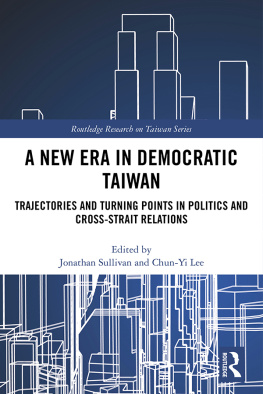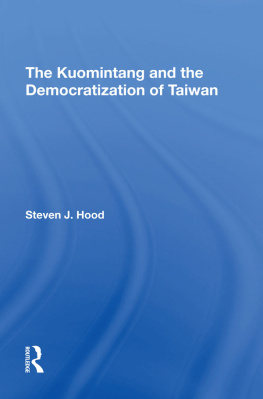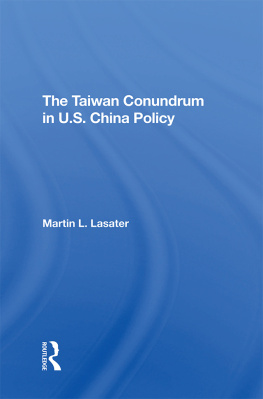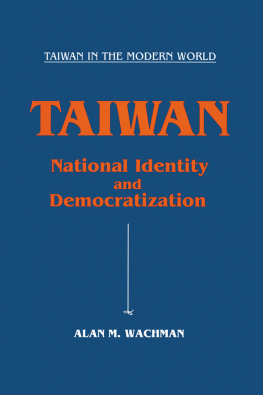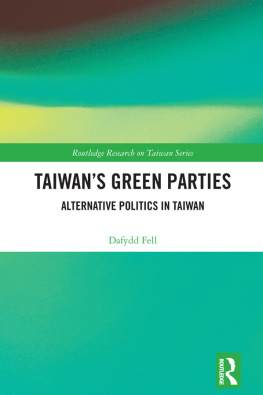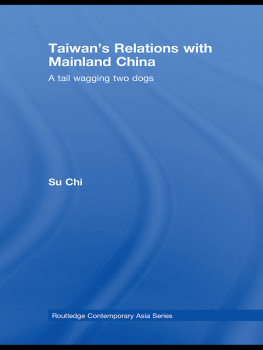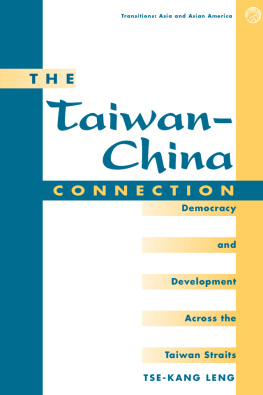Table of Contents
Pages
A New Era in Democratic Taiwan
In January 2016, Taiwans former authoritarian ruler, the KMT, the Nationalist Party of China, lost control of both the presidency and the legislature. Having led the democratization process in Taiwan during the 1980s, it had maintained a winning coalition among big business, the public sector, green-collar workers and local factions. Until now.
A New Era in Democratic Taiwan identifies past, present and future trajectories in party politics and state-society relations in Taiwan. Providing a comprehensive examination of public opinion data, it sheds light on significant changes in the composition of political attitudes among the electorate. Through theoretical and empirical analyses, this book also demonstrates the emergence of a new Taiwanese identity during the transition to democracy and shows how a diffusion of interests in society has led to an opening for niche political organizations. The result, it argues, is a long-term challenge to the ruling parties.
As the first book to evaluate Taiwans domestic and international circumstances after Tsais election in 2016, this book will be useful for students and scholars of Taiwan Studies and cross-Strait relations, as well as Asian politics more generally.
Jonathan Sullivan is Associate Professor in the School of Politics and International Relations (SPIR) at the University of Nottingham, UK, where he is also Director of the China Policy Institute and the China Soccer Observatory.
Chun-Yi Lee is Associate Professor in the School of Politics and International Relations (SPIR) at the University of Nottingham, UK, where she is also Director of the Taiwan Studies Programme.
Routledge Research on Taiwan Series
Series Editor: Dafydd Fell
SOAS, UK
The Routledge Research on Taiwan Series seeks to publish quality research on all aspects of Taiwan studies. Taking an interdisciplinary approach, the books will cover topics such as politics, economic development, culture, society, anthropology and history.
This new book series will include the best possible scholarship from the social sciences and the humanities and welcomes submissions from established authors in the field as well as from younger authors. In addition to research monographs and edited volumes, general works or textbooks with a broader appeal will be considered.
The Series is advised by an international Editorial Board and edited by Dafydd Fell of the Centre of Taiwan Studies at the School of Oriental and African Studies, London.
22 Changing Taiwanese Identities
Edited by J. Bruce Jacobs and Peter Kang
23 Government and Politics in Taiwan, 2nd Edition
Dafydd Fell
24 Connecting Taiwan
Participation Integration Impacts
Edited by Carsten Storm
25 Assessing the Presidency of Ma Ying-jiu in Taiwan
Hopeful Beginning, Hopeless End?
Edited by Andr Beckershoff and Gunter Schubert
26 A New Era in Democratic Taiwan
Trajectories and Turning Points in Politics and Cross-Strait Relations
Edited by Jonathan Sullivan and Chun-Yi Lee
For more information about this series, please visit: www.routledge.com/asianstudies/series/RRTAIWAN
A New Era in Democratic Taiwan
Trajectories and Turning Points in Politics and Cross-Strait Relations
Edited by Jonathan Sullivan and Chun-Yi Lee

First published 2018
by Routledge
2 Park Square, Milton Park, Abingdon, Oxon OX14 4RN
and by Routledge
711 Third Avenue, New York, NY 10017
Routledge is an imprint of the Taylor & Francis Group, an informa business
2018 selection and editorial matter, Jonathan Sullivan and Chun-Yi Lee; individual chapters, the contributors
The right of Jonathan Sullivan and Chun-Yi Lee to be identified as the authors of the editorial matter, and of the authors for their individual chapters, has been asserted in accordance with sections 77 and 78 of the Copyright, Designs and Patents Act 1988.
All rights reserved. No part of this book may be reprinted or reproduced or utilised in any form or by any electronic, mechanical, or other means, now known or hereafter invented, including photocopying and recording, or in any information storage or retrieval system, without permission in writing from the publishers.
Trademark notice: Product or corporate names may be trademarks or registered trademarks, and are used only for identification and explanation without intent to infringe.
British Library Cataloguing-in-Publication Data
A catalogue record for this book is available from the British Library
Library of Congress Cataloging-in-Publication Data
Names: Sullivan, Jonathan, editor. | Lee, Chun-Yi, editor.
Title: A new era in democratic Taiwan : trajectories and turning points in politics and cross-strait relations / edited by Jonathan Sullivan and Chun-yi Lee.
Description: New York : Routledge, [2018] | Series: Routledge research on Taiwan series | Includes bibliographical references and index. Identifiers: LCCN 2018004348| ISBN 9781138062429 (hardback) | ISBN 9781315161648 (ebook)
Subjects: LCSH: Political cultureTaiwan. | Political partiesTaiwan. | DemocracyTaiwan. | National characteristics, TaiwanPolitical aspects. | TaiwanPolitics and government2000- | TaiwanForeign relations China. | ChinaForeign relationsTaiwan.
Classification: LCC JQ1536 .N49 2018 | DDC 320.951249dc23
LC record available at https://lccn.loc.gov/2018004348
ISBN: 978-1-138-06242-9 (hbk)
ISBN: 978-1-315-16164-8 (ebk)
Typeset in Times New Roman
by Wearset Ltd, Boldon, Tyne and Wear
Contents
JONATHAN SULLIVAN AND CHUN-YI LEE
NATHAN F. BATTO
FRANK MUYARD
DAFYDD FELL
MING - SHOHO
JONATHAN SULLIVAN, MING - YEH T. RAWNSLEY, CHIEN - SAN FENG AND JAMES SMYTH
EDWARD FRIEDMAN
SHELLEY RIGGER
SAA ISTENI
Tables
Figures
Introduction
Jonathan Sullivan and Chun-Yi Lee
On 16 January 2016, President Tsai Ing-wen was elected 14th President of the Republic of China (ROC). Her party, the Democratic Progressive Party (DPP), also returned a majority of seats in the Legislative Yuan. The 2016 elections were the sixth time the ROC president has been elected by popular vote and the eighth general election of all representatives to the Legislative Yuan. They also represent the third turnover of party-in-power, and the first time that the Democratic Progressive Party (DPP) has won simultaneous control of the presidency and the legislature. These are practical changes in the composition of political power in Taiwan. But Tsais victory is also symbolically important. First, Tsai is the ROCs first female president, and the only elected female leader of a Chinese-heritage polity. That gender hardly featured as an issue in her election is indicative of a society in Taiwan where tradition is becoming less of a barrier to political participation. Second, Tsai is a descendant of both Hakka and aboriginal ethnic groups. Within three months of her inauguration, on 1 August 2016, she formally apologized to Taiwans indigenous peoples for past injustices and unequal conditions imposed upon them under successive ROC governments (Ramzy, 2016). Tsais apology suggests an opportunity for Taiwan to embrace its minority peoples and redress the unfair treatment they have received in Taiwanese society. Third, the election of legislators representing small parties with social movement roots was a symbol of continuing support for diverse and progressive causes, and a demonstration that such causes can lead to political success.

